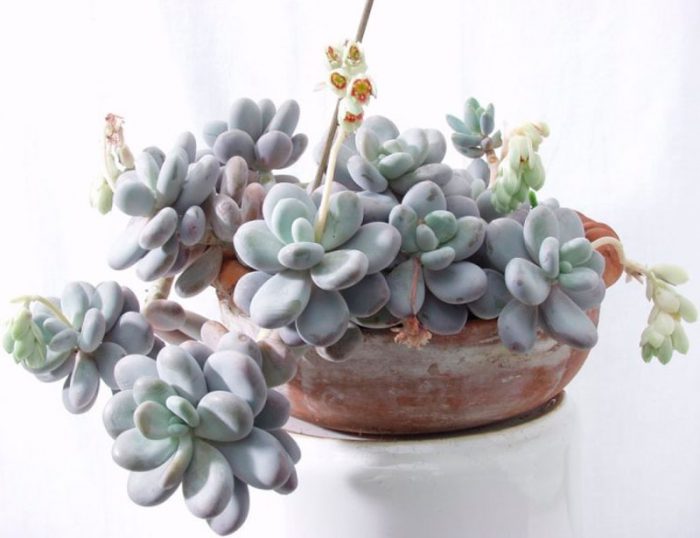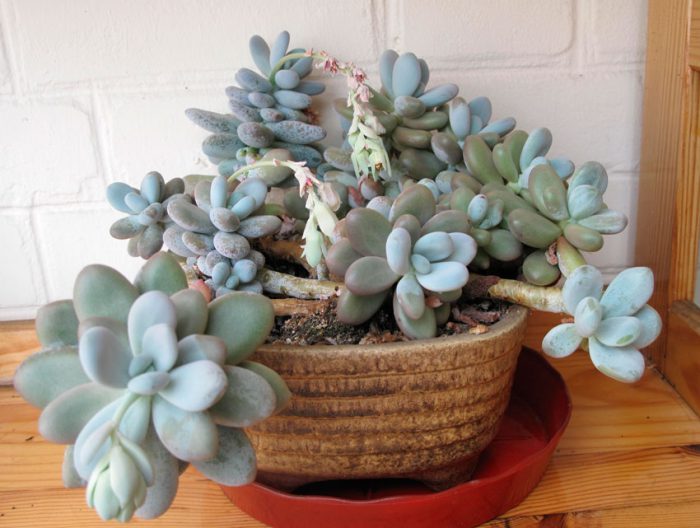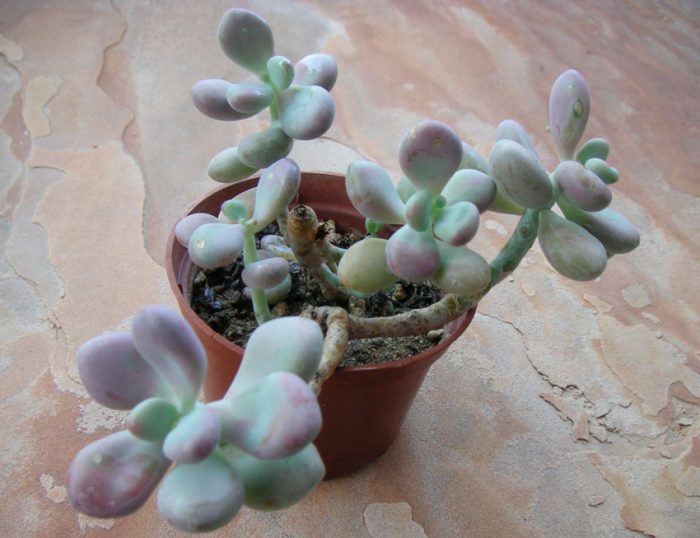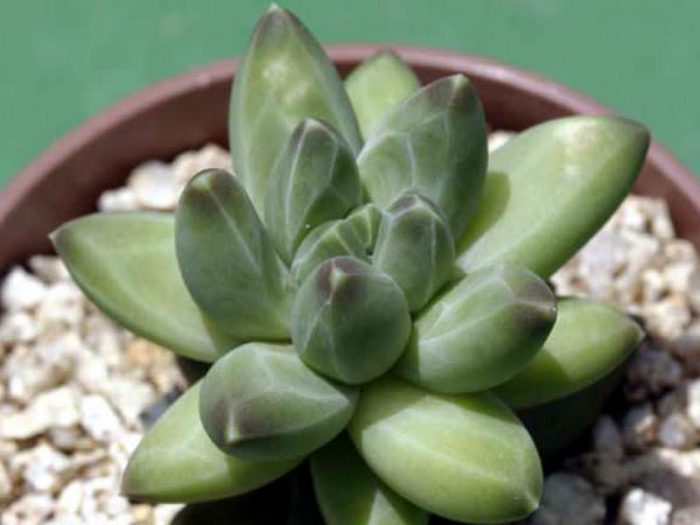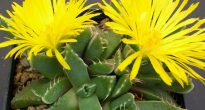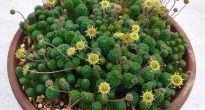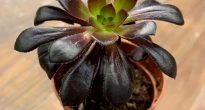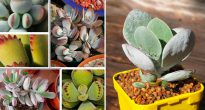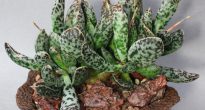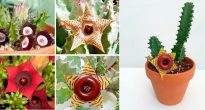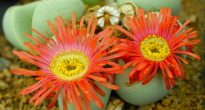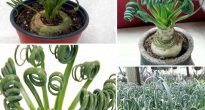Genus of plants pachyphytum (Pachyphytum) belongs to the family Crassulaceae. It contains about 10 species of succulent plants, which are endemic to various regions of Mexico. A common feature of such plants is succulent, rather thick leaves, which in size and shape are similar to a flattened elongated grape, painted in a light greenish-gray tint and having a whitish waxy coating on the surface. Thanks to its foliage, this genus was named pachyphytum, which in Greek means "thick-leaved".
Such plants are quite compact. So, creeping or lodging shoots are practically never longer than 30 centimeters. They are distinguished by short internodes. The leaves grow in a spiral, while they are located very tightly, it may even seem that they are collected in whorls. Smooth and rather long peduncles appear from the apical sinuses during the flowering period. They bear spike-shaped, low-flowered inflorescences that consist of small 5-petal drooping bell-shaped flowers. They can be painted pink, white or red. The sepals, like the leaves, are puffy, and there is a waxy coating on their surface. The seeds ripen in small pods.
Pachyphytum care at home
Such a succulent may well be grown by both experienced and novice florists, since it does not differ in its whimsicality.
Illumination
This is a fairly light-loving plant that needs bright lighting, but it should be shaded from the scorching rays of the midday sun. It is recommended to place it on a window of either western or eastern orientation. You can also place it on the north-facing window, but you need to be prepared for the color of the leaves to become paler, and their size will decrease. At the same time, flowering may also be absent.
Temperature regime
In summer, pachyphytum grows normally and develops at temperatures from 20 to 26 degrees. Well tolerates not too long rise in air temperature. But in the event that it is hot in the room for a long time, you need to arrange frequent ventilation, as well as protect the plant from direct sunlight. In the warm season, it is recommended to take pachyphytum to fresh air (to the garden, to the balcony).
In winter, he has a dormant period, and the plant must be rearranged to a cooler place (about 16 degrees). However, make sure that the temperature in the room does not drop below 10 degrees, as otherwise the flower may freeze.
How to water
Such a plant calmly tolerates drought, since a supply of liquid accumulates in its leaves. In this regard, it must be watered very carefully and for this one must pay attention to the condition of the soil in the pot. When the soil dries up to 1/3 of the depth, it is necessary to water it. Overflowing will have an extremely negative effect on the flower, since rot can form not only on the root system, but also on leaves saturated with moisture.
Humidity
Pachyphytum is quite calm about the dry air of city apartments and does not need additional humidification. At the same time, experts do not recommend arranging a shower for him for 2 reasons, namely: you can inadvertently damage either juicy leaves or a wax coating. And this, in turn, will lead to a decrease in decorativeness.
Earth mix
Suitable soil should be poor, loose, and neutral or slightly acidic. To prepare the soil mixture, you will need to combine the purchased soil for succulents and cacti with fine gravel and coarse-grained river sand, which should be taken in a ratio of 3: 1: 1.
Fertilizer
The plant needs feeding only during intensive growth, or rather, from mid-spring to mid-autumn. Moreover, during all this time, it is only necessary to apply fertilizer with a low nitrogen content to the soil 3 or 4 times. You can use a special fertilizer for succulents and cacti.
Breeding method
Most often propagated by cuttings. To do this, you need to cut off part of the apical stem, the length of which should vary from 5 to 7 centimeters. The cuttings are dried in the open air for 1–2 days, and then planted in the soil, while only the very tip should be buried. To make the stalk more stable, it is recommended to tie it to a support.
In order for the cutting to take root well, you will need to water it properly. Both waterlogging and overdrying of the earthen coma should not be allowed. Experts advise not to water the dried substrate, but to moisten it from a sprayer. It is worth remembering that it is impossible to cover the stalk with any kind of "cap", since rot quickly forms on it due to the increase in air humidity.
Rooting of leafy cuttings occurs in the same way.
Pests and diseases
This plant is resistant to both diseases and harmful insects. The most common problem is stagnation of liquid in the ground, too abundant watering and excessively high humidity. All this can contribute to the formation of root, leaf and stem rot.
Main types
Pachyphytum oviferous (Pachyphytum oviferum)
Also called "moonstone" - this is the most popular type among flower growers. Shoots can be up to 20 centimeters long and 1 centimeter wide. The lower surface of the branches is bare and there are scars on it that remain from fallen leaves. Bluish-gray leaves with a pink tint are obovate. In length they reach 5 centimeters, in width - 3 centimeters, and have a thickness equal to 1.5 centimeters. The plant blooms in July – September. The length of the peduncle is 20 centimeters. The spike-shaped inflorescence consists of whitish-green flowers with pinkish specks. Their blooming occurs gradually, while it begins from the bottom of the inflorescence. Sepals are bluish-white.
Pachyphytum bracts (Pachyphytum bracteosum)
It is also quite popular with flower growers. In length, shoots can reach more than 30 centimeters, while their width is only 2 centimeters. Elongated sheet plates are flatter than the previous type. They are found only on the upper part of the shoot, and that's all, because after a while the adult leaves fall off.The leaves reach 10 centimeters long, 5 centimeters wide and one centimeter thick. The leaves are silvery-white in color, with a strong bloom of wax on the surface, which casts a little pink in bright sunlight. Flowering occurs in August – November. The peduncle reaches a height of 40 centimeters. The flowers are red.
Compact pachyphytum (Pachyphytum compactum)
This miniature plant has the most spectacular appearance of all. Its shoots are no more than 10 centimeters long. The obovate leaflets have pointed tips. Their length can be up to 4 centimeters, while the width and thickness are equal to - 1 centimeter. The leaf plate is colored dark green, while on its surface there are pale gray waxy stains, due to which a marble pattern appears. Outwardly, they are similar to the kidneys of a rather large size. The entire surface of the shoot is covered with leaves. In this case, only the oldest parts of the stems are bare. In spring, rather thick peduncles grow, reaching 40 centimeters in length. Each of the peduncles can have 3-10 orange-red flowers, while the tips of the petals are bluish. Sepals are colored pink or green. It happens that the tips of old leaf plates become reddish.

